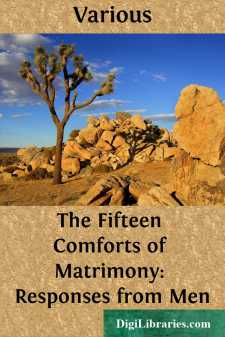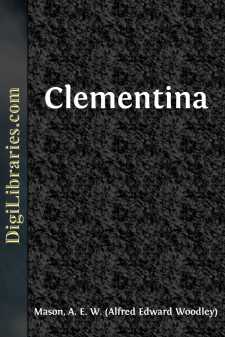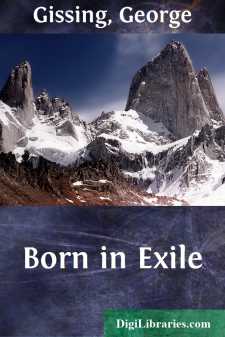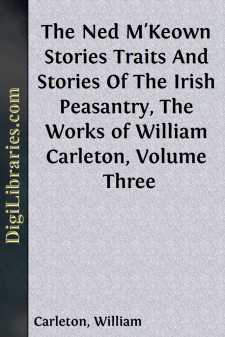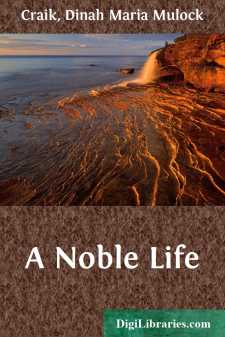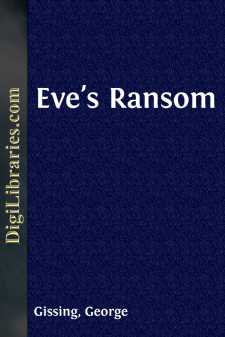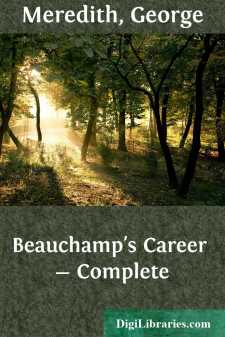Literary Collections
- American 84
- Ancient, Classical & Medieval 14
- Asian 1
- Australian & Oceanian 1
- Canadian 55
- Continental European 121
- English, Irish, Scottish, Welsh
- Essays 160
- General 24
- Letters 46
- Middle Eastern 1
English, Irish, Scottish, Welsh Books
Sort by:
by:
Various
The First Comfort of Matrimony.Happy were Man, when born as free as Air,Did he that freedom as he ought, prefer;But the first Thing he sets his Heart upon,Is to be Married, and to be undone:On some youngGirlhe casts his wanton Eyes,And wooes her with fine Complements and Toys.But that's not all—he grows in Love at last,And is impatient till those Joys he taste:Nor do's the wishing Virgin...
more...
CHAPTER I The landlord, the lady, and Mr. Charles Wogan were all three, it seemed, in luck's way that September morning of the year 1719. Wogan was not surprised, his luck for the moment was altogether in, so that even when his horse stumbled and went lame at a desolate part of the road from Florence to Bologna, he had no doubt but that somehow fortune would serve him. His horse stepped gingerly...
more...
by:
George Gissing
CHAPTER I The summer day in 1874 which closed the annual session of Whitelaw College was marked by a special ceremony, preceding the wonted distribution of academic rewards. At eleven in the morning (just as a heavy shower fell from the smoke-canopy above the roaring streets) the municipal authorities, educational dignitaries, and prominent burgesses of Kingsmill assembled on an open space before the...
more...
by:
William Carleton
INTRODUCTION. It will naturally be expected, upon a new issue of works which may be said to treat exclusively of a people who form such an important and interesting portion of the empire as the Irish peasantry do, that the author should endeavor to prepare the minds of his readers—especially those of the English and Scotch—for understanding more clearly their general character, habits of thought,...
more...
Chapter 1 Many years ago, how many need not be recorded, there lived in his ancestral castle, in the far north of Scotland, the last Earl of Cairnforth. You will not find his name in "Lodge's Peerage," for, as I say, he was the last earl, and with him the title became extinct. It had been borne for centuries by many noble and gallant men, who had lived worthily or died bravely. But I think...
more...
A MIST WRAITH The autumn afternoon was fading into evening. It had been cloudy weather, but the clouds had softened and broken up. Now they were lost in slowly darkening blue. The sea was perfectly and utterly still. It seemed to sleep, but in its sleep it still waxed with the rising tide. The eye could not mark its slow increase, but Beatrice, standing upon the farthest point of the Dog Rocks, idly...
more...
by:
George Gissing
CHAPTER I On the station platform at Dudley Port, in the dusk of a February afternoon, half-a-dozen people waited for the train to Birmingham. A south-west wind had loaded the air with moisture, which dripped at moments, thinly and sluggishly, from a featureless sky. The lamps, just lighted, cast upon wet wood and metal a pale yellow shimmer; voices sounded with peculiar clearness; so did the rumble of...
more...
by:
George Meredith
CHAPTER I. THE CHAMPION OF HIS COUNTRY When young Nevil Beauchamp was throwing off his midshipman's jacket for a holiday in the garb of peace, we had across Channel a host of dreadful military officers flashing swords at us for some critical observations of ours upon their sovereign, threatening Afric's fires and savagery. The case occurred in old days now and again, sometimes, upon imagined...
more...
by:
Dornford Yates
HOW WILL NOGGIN WAS FOOLED, AND BERRY RODE FORTH AGAINST HIS WILL. "Who's going to church?" said Daphne, consulting her wrist-watch. There was a profound silence. My sister turned to Jill. "Are you coming?" she said. "Berry and I are." "I beg your pardon," said her husband. "Of course you're coming," said Daphne. "Not in these trousers. This is the...
more...
by:
Andrew Lang
CHAPTER I: ADVENTURES AMONG BOOKS I In an age of reminiscences, is there room for the confessions of a veteran, who remembers a great deal about books and very little about people? I have often wondered that a Biographia Literaria has so seldom been attempted—a biography or autobiography of a man in his relations with other minds. Coleridge, to be sure, gave this name to a work of his, but he...
more...


